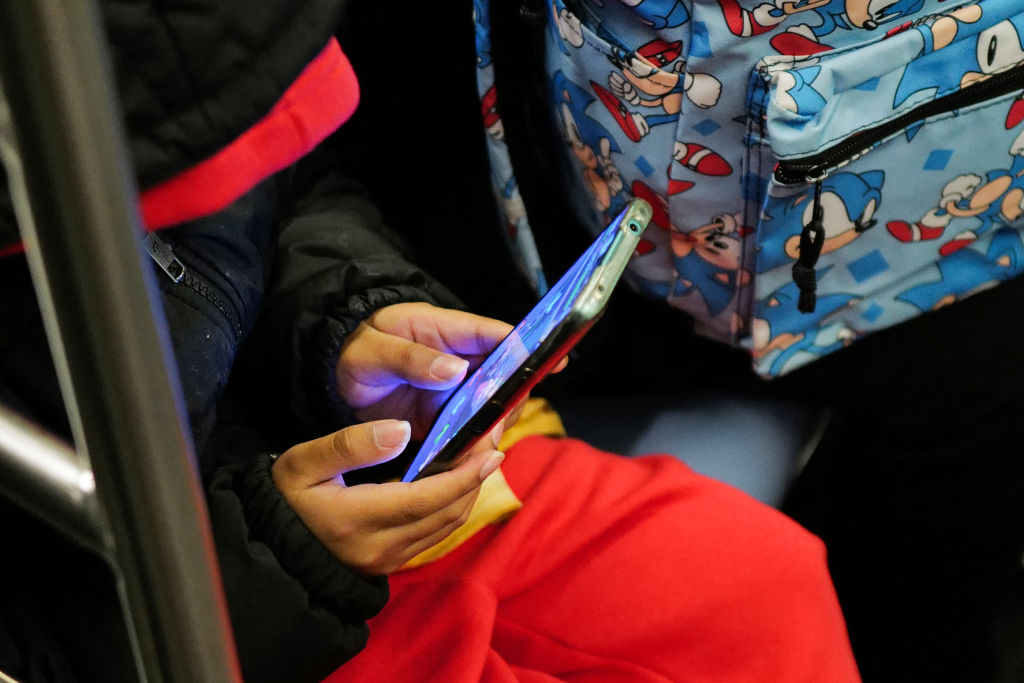Should students be allowed to use their phones during school? The answer seems like it should obviously be no. But apparently this is has become a difficult subject for school districts to grapple with. Across the country, school boards and administrators recognize that phones distract students from learning, diminish attention spans and affect students’ mental health. But few have the gumption to remove personal devices entirely from schools.
Down the road from me in Virginia, the Loudoun County school district is seeking parental input on its phone policy; a draft policy states that elementary school kids cannot use personal technology devices at all, middle school kids must keep phones off and away during the school day unless granted an exception and high-schoolers can use them during non-instructional periods (lunch, class changes, etc.).
(As an aside, it’s a bit funny that the same school district that repeatedly rejected parents’ concerns over its Covid and gender-related policies, introduction of critical race theory into the curriculum and inclusion of sexually explicit books in the library and lied to parents about a sexual assault on school property now wants parents’ input.)
Of course, even allowing a phone in a students’ pocket is a dangerous game. We all know the itch we get to check our screen for notifications or to hop onto Twitter or another social media app for a few minutes of dopamine. As Pamela Paul writes in the New York Times, although about 77 percent of schools prohibit nonacademic cellphone use, “note the caveat ‘nonacademic’: many schools had simply integrated phones into their curriculum.”
Seemingly strict policies are only as good as their enforcement. A high school teacher at Clark County School District in Las Vegas, which restricts phone use during class, told the Wall Street Journal that she still has to reprimand students every few minutes because they know that, at worst, an infraction results in a call home to parents.
Clark County is now participating in a pilot program where students have to surrender phones to signal-blocking pouches during the school day. Montgomery Public Schools in Alabama uses the pouches and saw a 24 percent reduction in fights and misbehavior, which administrators mostly credit to the removal of the toxic influence of social media and group texts. Students in other districts with strict bans on phone usage say that they felt their social lives and mental health improve when the phones went away. They had real conversations with their peers at lunch or recess, felt more focused in class, and reported a drop in cyber bullying incidents. Teachers were relieved that students were more engaged throughout the day and also reported personal benefits to having their own phones out of reach.
These findings are consistent with research from social psychologist Jonathan Haidt’s new book, The Anxious Generation. Haidt argues that the spike in anxiety and depression among young Americans since 2010 can be directly attribute to smartphone use. Phones, he says, lead to social deprivation, sleep deprivation, attention fragmentation, and addiction, functionally rewiring childrens’ brains in ways that are extremely harmful to their development.
Some school districts are reluctant to take the Clark County approach because they fear reprisal from students, but most identify pushback from a more powerful bloc: parents. It’s mostly guardians who loudly complain when phones are taken from their kids at school, for a litany of reasons. Some claim they need to be able to reach their child in an emergency, others that they need to track their location to make sure they are where they’re supposed to be. There are more mundane excuses too; parents supposedly need direct access to their students for schedule changes, like when softball practice is canceled or a friend’s mom is no longer able to give a ride home from school. According to a poll by the National Parents Union Survey, 40 percent of parents even say they need to communicate with their child about their “mental health or other needs during the day.” Only 32 percent of parents surveyed said they think schools should ban phone use. Even within this group, most parents wanted students to be able to keep phones in their backpacks as opposed to locked away in a cubby or pouch.
Somehow we managed to figure out all of the logistical issues concerning parents before smartphones. Parents called the front office if there were an emergency. We could call or text our parents at the end of the school day with any major schedule updates, or we coordinated rides with friends or killed time at the library if anything came up. Even when we all started carrying cell phones in late middle school or high school, very few of us had smartphones or access to the internet, so sending a quick text was hardly the gateway drug that it is today. Some schools have mimicked that experience by offering students a Light Phone — a phone designed to be used as minimally as possible — during the school day.
Unfortunately, it’s hard to convince parents that we can go back in an era of helicopter parenting and safetyism. The reasons parents gave for wanting their kids to have phone access during the school day were summarized aptly by Elizabeth Nolan Brown at Reason: “a lot of parents want their kids to have phones at school because these parents are anxious, afraid, and/or overzealously policing their progeny’s whereabouts and feelings.” Perhaps due to our constant connection, parents have lost faith in their children’s ability to exist independently outside of the home or solve problems without parental input.
This attitude raises deeper questions than just kids and phone use. What effect will an overly attached parenting style have on a generation of young Americans? How are we going to raise confident, independent youngsters who are able to think critically about issues if we can’t trust them to go through a single school day without contacting their parents?
Indeed, we’re already seeing the effects of safetyism on our nation’s kids. Unstructured and outdoor playtime is less common among today’s youth, replaced by parents handing their kid a phone or tablet. Probably not coincidentally, teens are now more risk averse than ever. This has some positive effects — teen pregnancies are down, for example — but also some really concerning ones — teens are more likely to delay getting their driver’s licenses due to anxiety over driving and are displaying worrying anti-social trends. At the college level, Haidt and his co-author, Greg Lukianoff, explore in The Coddling of the American Mind how college students believe “offensive” speech can physically harm them, and Abigail Anthony writes in National Review about the rather absurd restrictions most campuses have on students using everyday appliances in their dorm rooms (no microwaves allowed!).
To sum up, we’re probably not worried enough at how many parents oppose banning phones in school.


























Leave a Reply